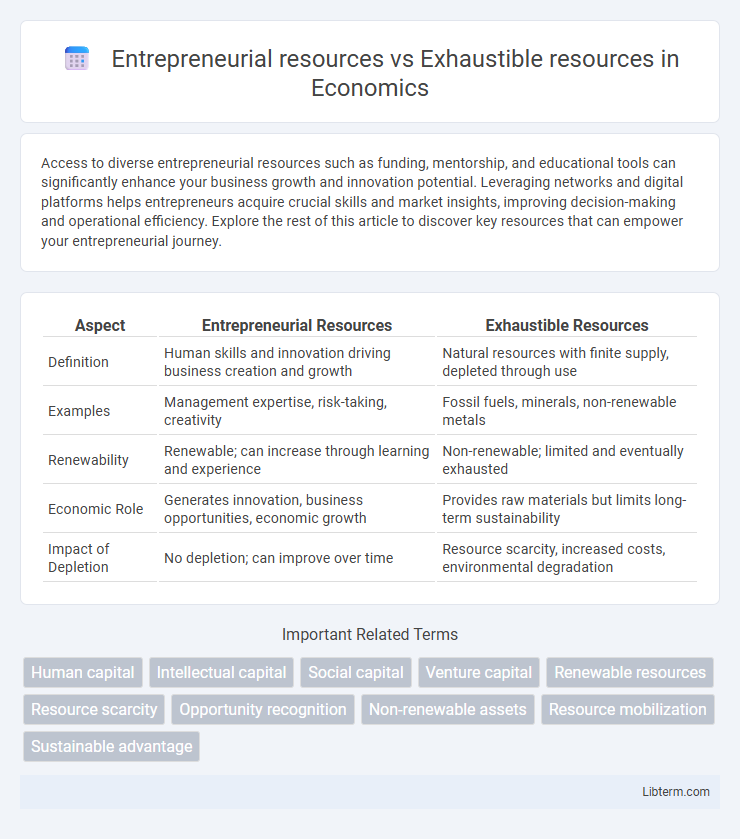Access to diverse entrepreneurial resources such as funding, mentorship, and educational tools can significantly enhance your business growth and innovation potential. Leveraging networks and digital platforms helps entrepreneurs acquire crucial skills and market insights, improving decision-making and operational efficiency. Explore the rest of this article to discover key resources that can empower your entrepreneurial journey.
Table of Comparison
| Aspect | Entrepreneurial Resources | Exhaustible Resources |
|---|---|---|
| Definition | Human skills and innovation driving business creation and growth | Natural resources with finite supply, depleted through use |
| Examples | Management expertise, risk-taking, creativity | Fossil fuels, minerals, non-renewable metals |
| Renewability | Renewable; can increase through learning and experience | Non-renewable; limited and eventually exhausted |
| Economic Role | Generates innovation, business opportunities, economic growth | Provides raw materials but limits long-term sustainability |
| Impact of Depletion | No depletion; can improve over time | Resource scarcity, increased costs, environmental degradation |
Defining Entrepreneurial Resources
Entrepreneurial resources refer to the intangible assets such as innovation, risk-taking ability, leadership, and management skills that drive business creation and growth. These resources differ from exhaustible resources, which are natural assets like minerals and fossil fuels that diminish over time with use. Defining entrepreneurial resources emphasizes their role in combining and mobilizing various inputs to generate economic value and sustainable competitive advantage.
Understanding Exhaustible Resources
Exhaustible resources are natural assets such as fossil fuels, minerals, and metals that cannot be replenished within a human timescale, leading to their gradual depletion through extraction and use. Understanding the finite nature of exhaustible resources is critical for sustainable economic planning and environmental preservation, as overconsumption can result in scarcity and increased costs. Effective management involves promoting alternative resources, improving efficiency, and investing in renewable technologies to reduce dependence on exhaustible materials.
Key Characteristics: Entrepreneurial vs Exhaustible Resources
Entrepreneurial resources encompass innovation, risk-taking, and decision-making capabilities central to business creation and growth, characterized by adaptability and proactive opportunity recognition. Exhaustible resources refer to finite natural assets like fossil fuels and minerals, defined by their limited availability and irreversible depletion upon use. The key distinction lies in entrepreneurial resources being intangible and regenerative through human creativity, whereas exhaustible resources are tangible and diminish with extraction.
Examples of Entrepreneurial Resources
Entrepreneurial resources encompass innovation, leadership skills, strategic vision, and risk-taking capabilities essential for business growth and adaptation in dynamic markets. Examples include a founder's ability to identify market gaps, develop business models, and mobilize financial capital and human resources effectively. Unlike exhaustible resources such as fossil fuels or minerals, entrepreneurial resources are renewable and can generate sustained economic value through creativity and decision-making.
Examples of Exhaustible Resources
Exhaustible resources are natural assets that cannot be replenished once depleted, such as fossil fuels (coal, oil, natural gas), minerals (gold, copper, iron ore), and certain groundwater reserves. These resources are finite and critical for industrial processes, energy production, and manufacturing, driving the need for sustainable management and alternative innovations. The depletion of exhaustible resources poses significant challenges for long-term economic growth and environmental conservation.
Resource Sustainability and Renewal
Entrepreneurial resources drive innovation and economic growth through continuous reinvestment and adaptation, making them inherently renewable and sustainable over time. In contrast, exhaustible resources such as fossil fuels and minerals face depletion, posing significant challenges to long-term sustainability and requiring careful management or alternative solutions for renewal. Effective resource sustainability hinges on maximizing entrepreneurial capabilities while minimizing reliance on finite exhaustible resources to ensure balanced economic development.
Impact on Economic Growth
Entrepreneurial resources drive economic growth by fostering innovation, creating new markets, and improving productivity through risk-taking and strategic decision-making. Exhaustible resources, such as fossil fuels and minerals, provide initial capital and industrial inputs but can limit long-term growth due to depletion and environmental costs. Sustainable economic development increasingly relies on leveraging entrepreneurial resources to maximize value while minimizing dependence on finite natural resources.
Challenges in Managing Resource Types
Entrepreneurial resources face challenges in adaptability and innovation management due to their intangible nature and reliance on human capital, making it difficult to measure and allocate effectively. Exhaustible resources present constraints related to depletion, environmental impact, and sustainable usage, requiring careful long-term planning and regulatory compliance. Balancing the dynamic needs of entrepreneurial resources with the finite availability of exhaustible resources creates complex strategic decisions for resource optimization in business operations.
Strategic Utilization for Competitive Advantage
Strategic utilization of entrepreneurial resources, including innovation, risk-taking, and leadership capabilities, enables businesses to adapt dynamically and gain sustained competitive advantage. In contrast, exhaustible resources, such as natural raw materials, require efficient management to prolong availability but inherently limit long-term competitiveness due to their finite nature. Emphasizing investment in entrepreneurial assets facilitates ongoing value creation and differentiation in evolving market conditions.
Future Trends in Resource Utilization
Entrepreneurial resources drive innovation and adaptability, enabling sustainable growth by efficiently allocating renewable assets and technology. Exhaustible resources, such as fossil fuels and minerals, face depletion risks, prompting a shift toward alternative energy and circular economy models. Future trends emphasize integrating smart resource management with artificial intelligence to optimize usage and reduce environmental impact.
Entrepreneurial resources Infographic

 libterm.com
libterm.com